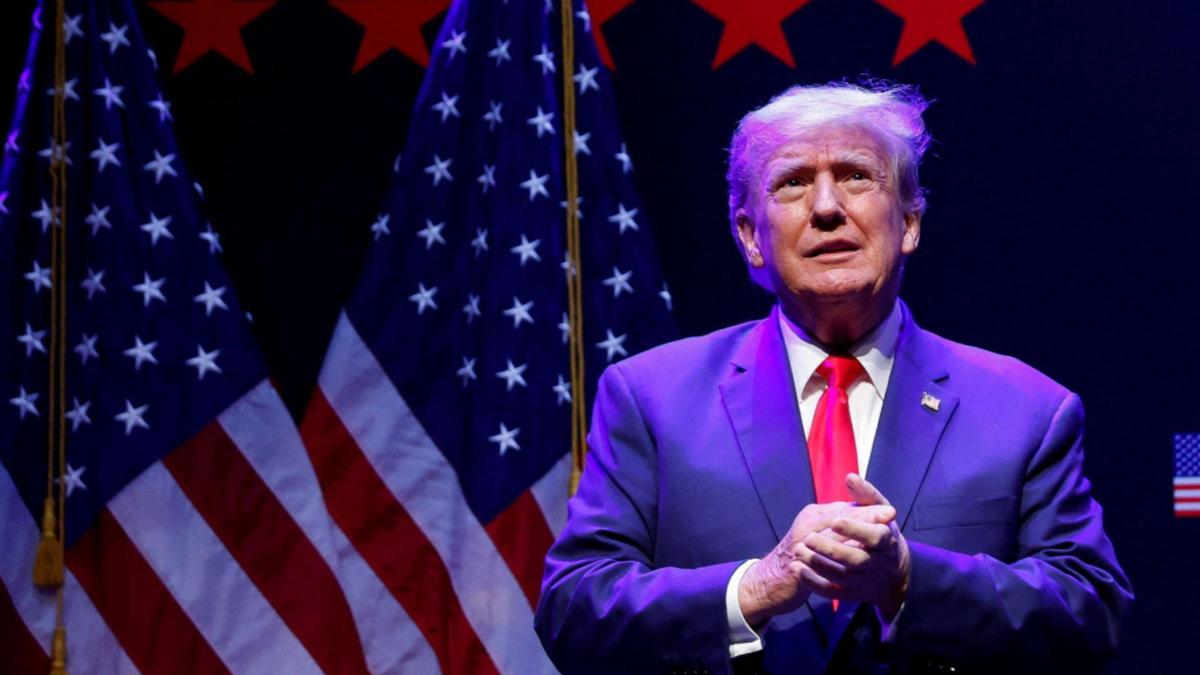Donald Trump’s pause on a suite of tariffs that shook global markets this week has been controversial and drawn accusations of market manipulation, but may simply be a hardball tactic to recalibrate the world economy to Washington’s advantage.
Trump’s reciprocal tariffs first struck after midnight on Wednesday, and sent markets plummeting. He was quick to post to his Truth Social platform after the start of morning trade, telling investors to “BE COOL! Everything is going to work out well. The USA will be bigger and better than ever before!” and, minutes later, “THIS IS A GREAT TIME TO BUY!!!.”
Within hours, he’d reversed course: While the US will maintain a universal 10% levy on imports at the border, a swath of additional taxes — for some nations as high as 50% — were lifted.
The news sent diving markets suddenly soaring to the biggest single day on the S&P 500 and second-best for the Nasdaq since 2008.
Only China saw its tariffs remain in place, with Trump further increasing them.
Democrats call for investigation into Trump tariff pause
The 90-day pause on tariffs and the subsequent market response saw opponents ask whether Trump had engaged in insider trading or market manipulation.
Those comments abounded on internet messaging boards and social media, with some buyers potentially making big returns by “buying the dip” on Wednesday.
On Thursday, Democratic House Minority Leader Hakeem Jeffries said his party would be “aggressively demanding answers and transparency particularly as it relates to stock purchase decisions that may have occurred over the last few days.” Senators Adam Schiff and Ruben Gallego are now seeking an ethics investigation into whether anyone benefited financially from advanced knowledge of Trump’s decision.
In response, White House spokesperson Kush Desai told The Washington Post that it was “the responsibility of the president of the United States to reassure markets and Americans about their economic security in the face of constant media scaremongering.”
Insider trading, which is an illegal act, refers to the practice of buying or selling stocks using information not available to the public. Market manipulation is more broadly defined as attempts to influence the free operation of the open market for profit.
No evidence has been produced to indicate Trump engaged in either practice. But Richard Painter, a former ethics lawyer in the George W. Bush administration, told DW that Wednesday’s events were unprecedented.
“We have never had a president before weigh in on where to buy or sell stocks in particular,” he said. “We’ve never had this happen when the administration is about to announce such significant changes to economic policies.”
Painter said an investigation should be made into “who knew what the president’s plan was on tariffs, and if anybody made trades based on that information.”
However, it appears unlikely that investigations would be brought about in either Congress — where both houses are Republican-controlled — or the US Securities and Exchange Commission, which is responsible for insider trading investigations.
Trump tactics ‘putting people on the back heel’
Some observers have pointed to Trump’s 1987 book “The Art of the Deal” as a compass to the administration’s current tariff playbook, and Trump himself has said his strategy has brought other economies to his door to renegotiate trade terms.
Others have suggested the decision to pause tariffs in response to the nosediving market indicates a chaotic economic strategy.
David Bieri, a former central and investment banker, now professor of economics at Virginia Tech, told DW it was unclear what Trump’s pause would mean for the US and global economy, but that it was simplistic to say the administration was making up policy on the fly.
Instead, he described the actions as a kind of “sonar” where Trump was testing the rest of the world to see how it would respond to his tariff-centric approach to trade.
“This is not him, as far as I read it, signaling a U-turn that he’s deviating from his agenda of tariffs,” said Bieri. “It’s simply giving people a bit of a breather, or a form of strategic dominance to constantly tweak the rules of the game.
“In negotiating tactics, this is very common, because it means you’re setting the tone — you’re putting people on the back heel, constantly.”
Bieri said there’s too much at stake to argue that Trump is manipulating the stock market. Instead, he said Trump’s plan is an attempt to address America’s changing role in the global economy, and historically high levels of debt.
“For the better part of 50 years, America’s role in the global economy has been changing,” he said.
“And there has been a lag in which America’s institutions are able to straddle the gap between what their role is globally, versus what their role is domestically … where [the US] is both a provider of global financial security and [economic] stability and with a rapidly changing domestic economy.”
After a tumultuous week on the markets, many will continue to guess at Trump’s possible next moves — especially with escalating tit-for-tat tariffs between the US and China now playing out. If the US is seeking to redefine its global economic role, Bieri said it leaves the door open for other economies to fill the leadership void.
“Whether they [the US] is going about in the right way remains to be seen, but it is clear that America’s position as one where … its subsidization of global public goods — goods that everybody enjoys and nobody really wants to contribute towards the enjoyment — that’s all been on American shoulders,” he said.
“If these times are over, one of the questions might be: who will step up in terms of global leadership? Do we want to leave it to China to slip into that vacuum? And what of the EU?”
Edited by: Martin Kuebler


